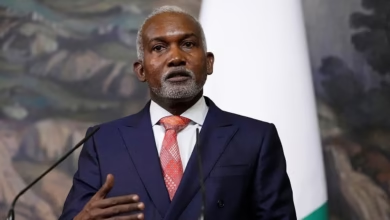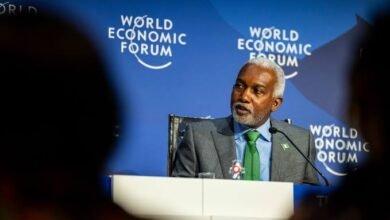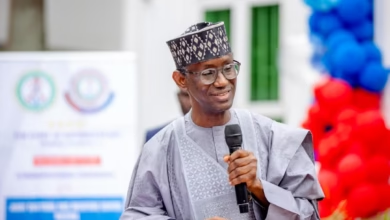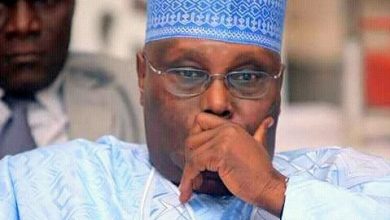
For anyone to say that Nigeria’s credibility abroad has eroded, or that there is a steady collapse of our foreign policy, implies that such a person has no idea what foreign policy is. Since President Olusegun Obasanjo left office in 2007, the country has not had a more clearly defined and coherent foreign policy stance than under President Bola Tinubu. And this is thanks to the Minister of Foreign Affairs, Ambassador Yusuf Tuggar.
Yusuf Tuggar is no new entrant into the conversation of diplomacy—as both diplomat and politician. Prior to his appointment as Nigeria’s Minister of Foreign Affairs in August 2023, he was Nigeria’s Ambassador to Germany from 2017 to 2023. During his ambassadorship, he notably facilitated significant diplomatic efforts including the successful repatriation of over 22 Benin Bronzes, advancement of bilateral trade and investment opportunities, enhanced security and migration agreements, and hosted Germany’s Chancellor Angela Merkel on a state visit to Nigeria.
He also played key roles in international climate negotiations and other major diplomatic engagements. Before his diplomatic career, Tuggar was a member of Nigeria’s House of Representatives from 2007 to 2011, where he chaired the Public Procurement Committee and was involved in governance reforms. He holds degrees in International Relations from the United States International University, San Diego, and a Master’s from the University of Cambridge.
On assumption of office, he defined Nigeria’s foreign policy strategy by anchoring it on what he described as the “4D Doctrine”—Democracy, Development, Diaspora, and Demography. The 4D Doctrine, also known as the Tinubu Doctrine, defines Nigeria’s diplomatic priorities within the context of our extant Afrocentric foreign policy tradition.
What does each pillar mean?
The Democracy pillar means that Nigeria will continue to promote and uphold democratic values, political stability, and the strengthening of democratic institutions both at home and abroad. It is in pursuit of this pillar that Ambassador Tuggar conceived the Regional Partnership for Democracy (RPD) initiative. The RPD, launched in collaboration with the United Nations Development Programme (UNDP), is designed to confront the democratic challenges facing West Africa. It is positioned as an African-led, people-centered effort to strengthen constitutional rule, institutional resilience, and inclusive governance across the sub-region.
The Demography pillar aims at harnessing Nigeria’s large and youthful population as a vital asset for global engagement. The doctrine emphasizes collaboration with countries that share similar demographic profiles to address common challenges and opportunities.
The Development pillar centers on how Nigeria will drive its economic growth and development through strategic diplomacy—focused on infrastructure, manufacturing, agriculture, and industrialization. This involves the promotion of trade, attraction of foreign investment, and fostering of regional economic integration.
This pillar has been particularly impactful in unlocking new trade corridors for Nigeria. The launch of the West Africa Economic Summit by Ambassador Tuggar, with the goal of driving cross-border industrialization, trade, and infrastructure integration within West Africa, flows directly from this pillar.
Ambassador Tuggar has been renowned for pushing deeper regional cooperation and investment in regional value chains, as well as policy harmonization to boost competitiveness and resilience. He has strongly advocated for stronger collaboration between Nigeria’s policy and research institutions to develop evidence-based reforms and foreign policy.
The Diaspora pillar emphasizes Nigeria’s rich diaspora population as a key national asset. The goal is to prioritize the well-being, engagement, and empowerment of Nigerians abroad, recognizing their role as a bridge for cultural, economic, and political exchange, as well as a key driver of Nigeria’s interests internationally.
Every student of diplomacy will agree that, together, these pillars reflect a strategic shift toward intentional, values-driven, and dynamic foreign relations aligned with Nigeria’s national interests. The 4D Doctrine seeks to enhance Nigeria’s global standing, promote African unity, maximize economic opportunities, and reinforce national security and trade through purposeful partnerships and multilateral engagement.
It is nauseating to read that a so-called activist and pharmacist, with zero training or background in foreign relations, named “Elder Karofi,” claims there is a steady collapse of Nigeria’s foreign policy. His comments do not only show a lack of understanding, but also a lack of restraint in exposing it.
There is no doubt that in the past two years, under Ambassador Yusuf Tuggar’s leadership, Nigeria has forged a stronger identity than ever before. The country’s recent outing at the UNGA 80 is evidence that Nigeria’s voice in the international space is stronger than ever. Did we not all see how the West reacted with propaganda against Nigeria, rattled by the statement delivered by Vice President Kashim Shettima? Who can, in good faith, say that Nigeria has lost its voice in the global space? In fact, our voice is at its loudest.
When the United States issued a visa policy that ran foul of the principle of reciprocity governing the global visa system, Ambassador Tuggar did not mince words in stating Nigeria’s position and demanding respect.
When the Ministry of Foreign Affairs and its missions across the world faced challenges, Ambassador Tuggar stepped in decisively. He engaged with the Office of the Accountant-General and the Federal Ministry of Finance to recover shortfalls and expedite the release of allocations for personnel and overhead costs. Additionally, he met with the Minister of Finance, Mr. Wale Edun, to ensure the 2025 budget aligns with Nigeria’s foreign policy priorities and to lay the foundation for sustainable financing in subsequent years. The ministry, under his leadership, is also developing a sustainable financial framework and exploring innovative strategies for the long-term stability of diplomatic funding.
– Nathaniel C. Adoji a journalist, writes from Abuja





